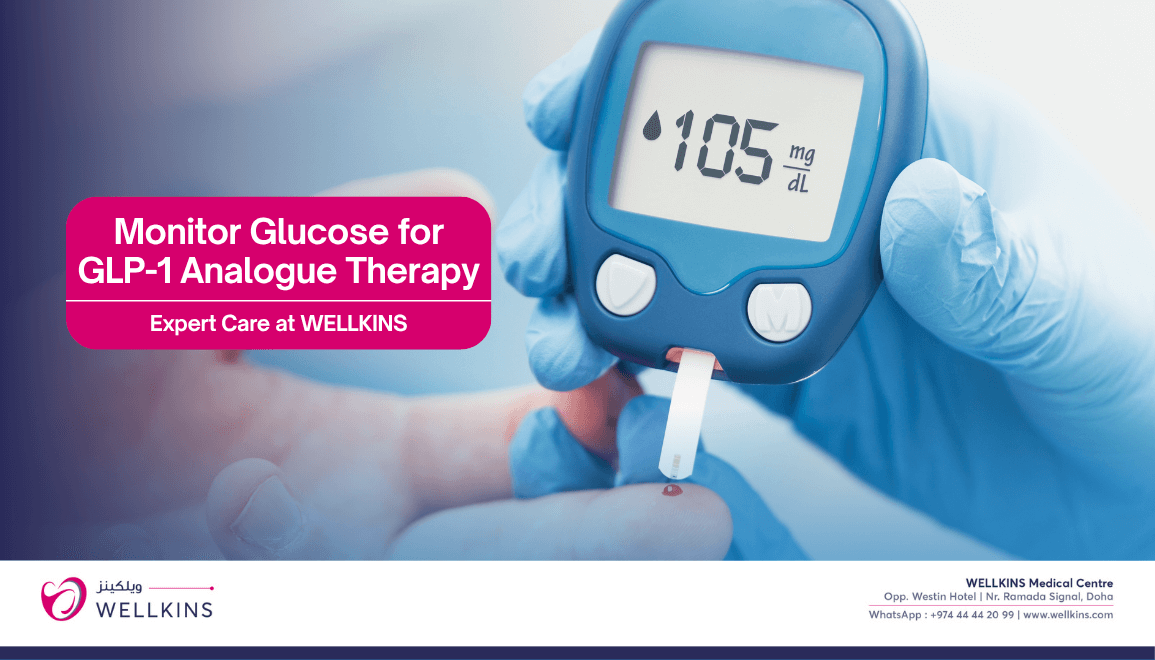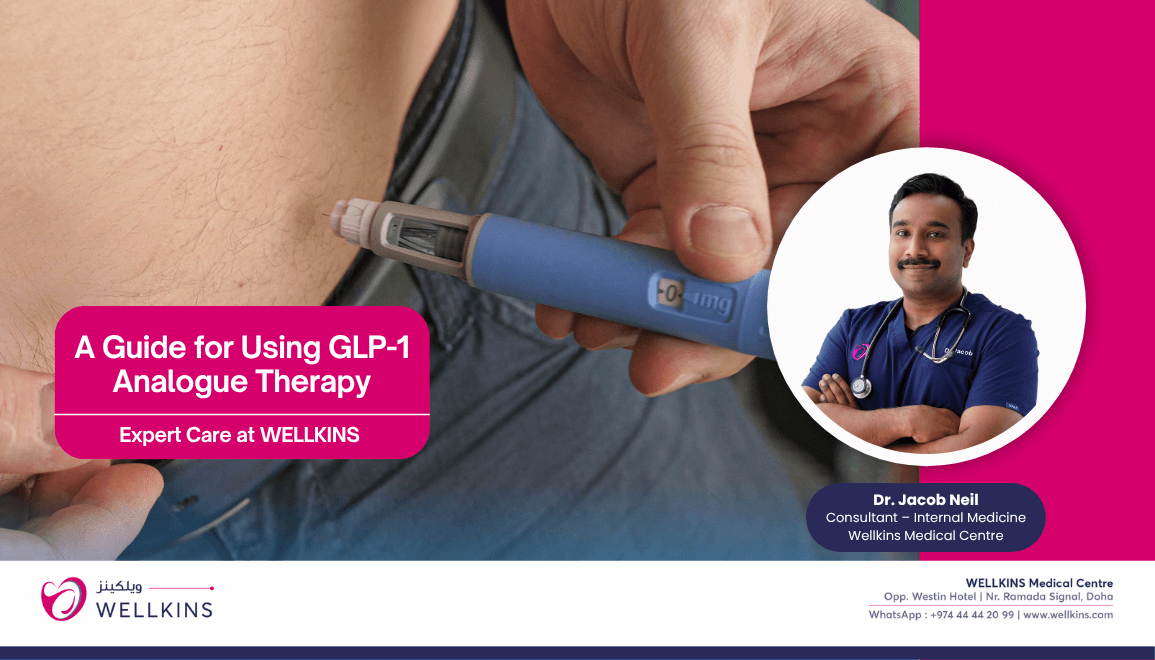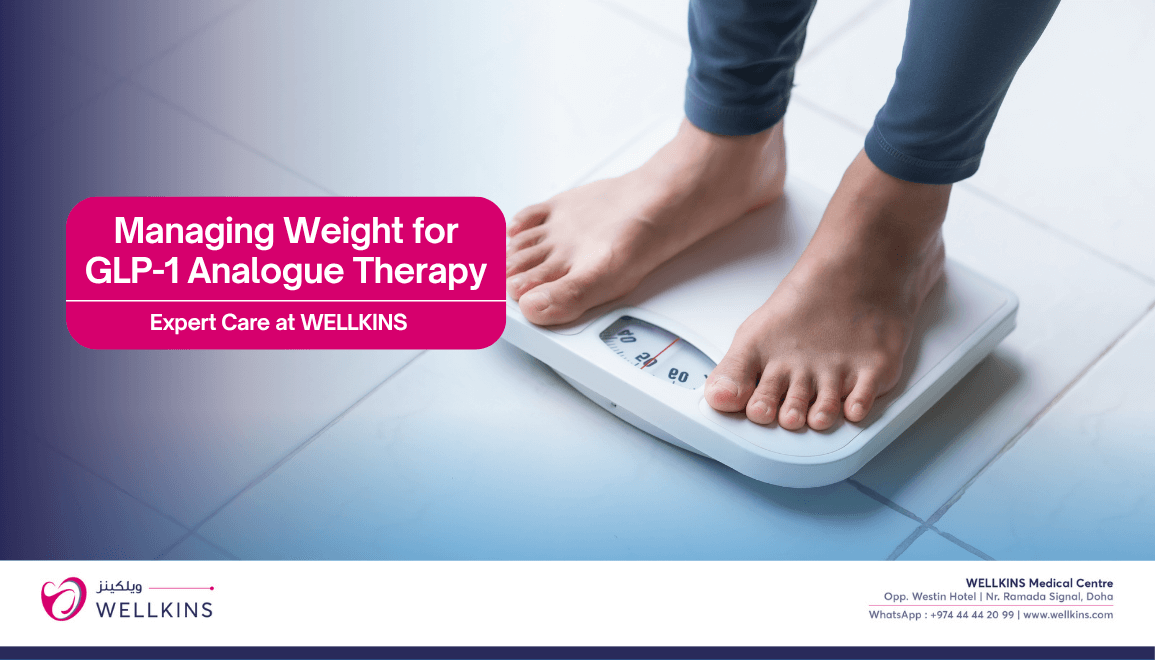Author: Dr. Jacob Neil (Consultant – Internal Medicine – Wellkins Medical Centre)
Glucagon-like peptide-1 (GLP-1) analogue therapy has revolutionized the management of Type 2 Diabetes and chronic weight management. Medications are highly effective because they mimic a natural gut hormone, slowing digestion and improving insulin response. However, like all powerful medications, GLP-1 analogues require careful medical supervision and adherence to specific precautions. Here is a guide to the essential steps and safeguards to follow before and during GLP-1 analogue therapy.
“GLP-1 analogues are powerful metabolic tools, but they demand strict medical oversight. Treatment requires the same commitment as a structured health plan. Mandatory screening must confirm no history of Pancreatitis or Medullary Thyroid Carcinoma (MTC). Continuous monitoring of kidney function and severe GI symptoms is non negotiable for safe, long term use. These are potent medications; screening and follow-up are essential.”
Precautions While Using GLP-1 Analogue Therapy
While Using GLP-1 Analogue Therapy requires mandatory screening for a personal or family history of Medullary Thyroid Carcinoma (MTC) and prior Pancreatitis before use. Patients must diligently monitor for severe gastrointestinal side effects and ensure regular checks of renal (kidney) function, as these potent medications necessitate strict medical oversight for safe, long-term administration.

Before Starting
Starting GLP-1 therapy is not a decision to be taken lightly. A thorough medical history and baseline testing are mandatory to ensure the treatment is safe for you.
Medical Evaluation – Rule Out Key Risks
Your physician must first rule out serious pre-existing conditions where GLP-1 analogues are contraindicated:
- History of pancreatitis
- Medullary thyroid carcinoma (MTC) or family history of MEN-2 (contraindicated)
- Severe gastrointestinal disease (gastroparesis, severe reflux)
- Significant renal impairment (dose adjustment/avoid in severe CKD)
- Baseline labs: fasting glucose, HbA1c, renal & liver function.
During Treatment:
The majority of side effects are gastrointestinal (GI) and manageable with careful attention to dosage and diet.
Titrate dose slowly: to minimize nausea and vomiting.
Eat smaller, slower meals: to reduce GI side effects.
Stay hydrated: vomiting can cause dehydration, especially in diabetics or kidney disease.
Do not use with other drugs that cause hypoglycemia: (e.g., sulfonylureas, insulin) without medical supervision; may need dose adjustment.
Monitor glucose regularly: especially in diabetics or during dose changes.
Stop and seek medical help immediately if:
- Severe abdominal pain or persistent vomiting → possible pancreatitis
- Neck lump, hoarseness, or difficulty swallowing → possible thyroid issue
- Signs of dehydration, dizziness, or weakness

Lifestyle & Diet
- Avoid overeating medication slows stomach emptying, so excess food worsens nausea.
- Limit alcohol increases risk of hypoglycemia (if on other glucose-lowering agents) and pancreatitis.
- Healthy diet and exercise improve results and reduce side effects.
Special Precautions
- Pregnancy & breastfeeding: not recommended. Stop at least 2 months before planning pregnancy (for semaglutide).
- Injection sites: rotate between abdomen, thigh, and upper arm; don’t inject into same spot repeatedly.
- Missed doses: follow product specific guidance (usually take as soon as remembered unless near next dose).
Follow-up
- Weight, HbA1c, BP monitoring
- Kidney and liver function
- Assessment of GI or thyroid side effects
Summary
GLP-1 analogues represent a powerful leap forward in managing diabetes and weight, but their effectiveness is directly tied to safety and supervision. At Wellkins Medical Centre, we ensure you receive the highest standard of care, beginning with mandatory complete screening to rule out contraindications like pancreatitis or thyroid malignancy risk. We provide personalized dosing guidance, detailed education on managing common GI side effects and critical, regular follow up monitoring of your kidney function, blood sugar and overall well being.
To book an appointment at Wellkins Medical Centre: https://wellkins.com/visit







